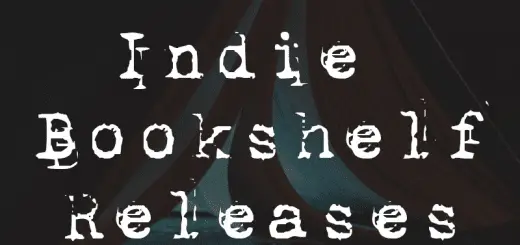The Horror Tree Presents…An Interview with John Reinhart
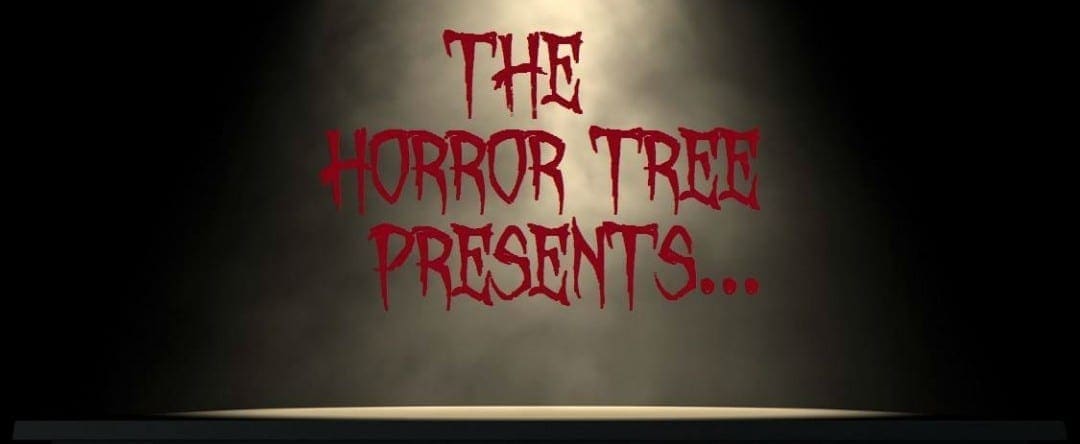
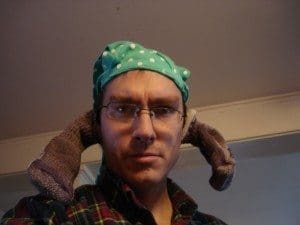 Ruschelle: John, nice to meet you. I hope after this interview you can say the same about me. Let’s get to the meat and crunchy bones of some things. First-this love of fire. You mention on a few web pages that you’re an arsonist. Did you go to school for that? Explain this crazy love of flame.
Ruschelle: John, nice to meet you. I hope after this interview you can say the same about me. Let’s get to the meat and crunchy bones of some things. First-this love of fire. You mention on a few web pages that you’re an arsonist. Did you go to school for that? Explain this crazy love of flame.
John: Actually, I went to school to be a plumber but I found the sewage kept me from wearing the cowboy shirts with false pearl buttons that I preferred. While I appreciate Leonard Cohen, I also couldn’t reconcile the idea that the crack is where the light gets in. It does. It’s true. Just not my style.
The love of flame began somewhere around Phoenix. I was eight and a friend gave me a collection of Russian fairy tales for my birthday. It was one of those gifts. An eight-year-old with a doorstop. Then I opened the pages and the pages turned into birds, roosted on the shelves in my room, then burst into flame. My parents were weirded out, but there wasn’t any harm done, and the stories were good.
I’ve been lighting things on fire ever since. As a matter of fact, in an effort to fan the flames, my next chapbook is a course in arson. It starts with a syllabus for self-study.
Ruschelle: You are a poet. And as 1970’s singer Phoebe Snow crooned, “…you make things alright.” (Damn I’m old) Is that true of your poetry? Do you make things alright or do prefer to dirty things up and make the world wonder what you’re up to? Hence-arsonist. What does your poetry focus on when you word-sculpt your mini-masterpieces?
John: In addition to poetry, I’m a collage artist, which I think applies to my assembling words together too. Artistically, I work to redeem the discarded mediocrity. Poetically, my work tends in several directions – experimental, social, and darkly speculative. Humor weaves everything together, softening some of the punches so that readers don’t realize the beating until they’re six rounds in.
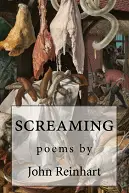 Ruschelle: Correct me if I’m wrong, but as of 2017 you have written five collections of poetry. How long does it take you to craft each work of poetry? Do you save certain poems for certain works (themed) or is your work written, collected and dispersed with a ‘devil can get bent’ attitude?
Ruschelle: Correct me if I’m wrong, but as of 2017 you have written five collections of poetry. How long does it take you to craft each work of poetry? Do you save certain poems for certain works (themed) or is your work written, collected and dispersed with a ‘devil can get bent’ attitude?
John: Correct. My latest collection, “screaming,” was composed last summer. I simply sat down every night and committed to writing a prose poetry sort of piece with the idea of nightmares. Usually, I am not so systematic, but notice themes or particular gems that I begin to orbit – “arson” for example. Then the collections assemble themselves. I’m working to get the poems to write themselves. When I quit the day job, you can ask how that’s going.
Sometimes I have an idea for a collection, for instance, a series of poems covering the Bobby Fischer-Boris Spassky chess championship from 1972, but the poems themselves simmer for years, occasionally evaporating entirely, sometimes they turn into sugared crystals.
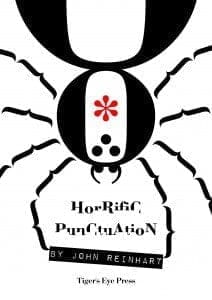 Ruschelle: We all remember our first, even when we’d rather forget they ever existed. What was your first and does it still haunt you to this day. And I am talking about writing and not first boy/girlfriends…who occasionally have a haunting quality. And not always in a good way! LOL
Ruschelle: We all remember our first, even when we’d rather forget they ever existed. What was your first and does it still haunt you to this day. And I am talking about writing and not first boy/girlfriends…who occasionally have a haunting quality. And not always in a good way! LOL
John: I do remember my first four-line poem. It was a something sappy and I snuck it into a girl’s pencil box. Think Percy Shelley’s sonnet “Lift not the painted veil” without any talent, depth of thought, or experience.
Ruschelle: Is there one poem that you have written that you love more than your other poem children?
John: The Butterflies of Traxl IV stands out (published in Pedestal Magazine, and nominated for a Rhysling Award in 2017 http://www.thepedestalmagazine.com/john-reinhart-the-butterflies-of-traxl-iv/). This one stands out because I write so few long poems. After reading the previous year’s Rhysling anthology, I challenged myself to try writing a long poem. This was my most successful result of the few I attempted. I think that this poem captures what I try to bring through my speculative work.
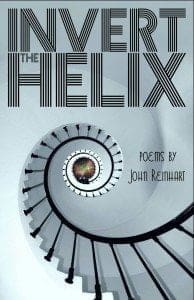 Ruschelle: You play music with your brother Patrick, under the name Reinhart Brothers and can be found on Pandora and can be PURCHASED online at https://reinhartbrothers.bandcamp.com/. Do you find that being a musician is easier or tougher than being a poet? Or is it one in the same?
Ruschelle: You play music with your brother Patrick, under the name Reinhart Brothers and can be found on Pandora and can be PURCHASED online at https://reinhartbrothers.bandcamp.com/. Do you find that being a musician is easier or tougher than being a poet? Or is it one in the same?
John: Music is tougher because you disturb more people when you practice. It also takes effort to get together with other musicians, which is the crux of what makes music live. The same might be said for poetry, but it’s easier to get more out of poetry sitting alone in the dark.
Ruschelle: You have three children? Do you believe any of them will be nibbled by the writing monster?
John: They all already play incessantly with words. The latest game is to take something benign someone else has said and add their own twist to it: “Yes, I did.” … “Poop!” They’re also fascinated with the subtleties inherent in our limited language. They can all recite several Shel Silverstein poems (“someone ate the baby”) or snippets they hear me recite whenever I find an excuse.
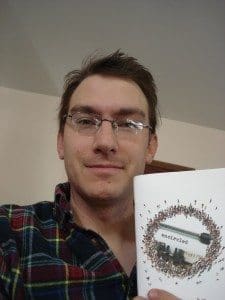 Ruschelle: Poop is always funny no matter what the age. Or maybe that’s just me. Heh heh. Your poem buried under light- pulls your daughter into your world of words. How often do your children inspire your works?
Ruschelle: Poop is always funny no matter what the age. Or maybe that’s just me. Heh heh. Your poem buried under light- pulls your daughter into your world of words. How often do your children inspire your works?
John: My children inspire pretty much everything I do. My first chapbook, “encircled,” was focused around the people in my life – my children, my wife, my friends, my colleagues, my students, my neighbors. In March sometime, Man In the Street Magazine (https://www.maninthestreetmag.com) will publish an online chapbook feature with poems exclusively about my children. I have another full-length manuscript in the wings that is something like a sequel to “encircled.”
Kids approach the world without the same inhibitions, fears, or assumptions that adults have. They’re open still, flexible. Imagination is true. I leech as much from them as I can. Sometimes poems come in the form of a baseball unexpectedly whizzing toward my head, but also as much from simple questions like, “Papa, can we make a guitar?” their fascination with magic tricks, or just their observations of a world I have to struggle to see.
They also fuel poems about my fears.
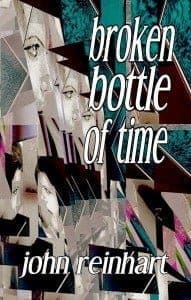 Ruschelle: Is there a certain poet or book of poetry that assisted you in finding your own poet’s voice?
Ruschelle: Is there a certain poet or book of poetry that assisted you in finding your own poet’s voice?
John: I am deeply indebted to Donald Rumsfeld, e.e. Cummings, Leonard Cohen, Wisława Szymborska, Ric Mastens, Tom Waits, Rob Stuart, Campbell McGrath, Robert Service, Wolfgang Carstens, Diogenes, Todd Snider, Kenneth Rexroth, Paul Goodman, Matt Borczon, and Aram Saroyan, perhaps in that order, but probably not.
Ruschelle: You won the 2016 Dark Poetry Scholarship from the Horror Writers Association. Brava! Explain what all entailed winning such a prestigious award.
John: I started my poetic career by writing Hallmark greetings. After a few years I needed to branch out, so I kidnapped a few half-starved up-and-coming spec poets, extracted what was necessary, ditched the poets and the greeting cards, and hit the pavement for every spec journal, magazine, blog, or associated venue. By 2016, I had assembled enough dark poetry to blot out my bubblegum past. A few well-targeted threats may have helped my cause.
Ruschelle: Obviously, since you won a Horror Writers Association award, you’re a member! Unless you snuck in…you crazy little fireball. How has being a part of the HWA helped you in the writing world?
John: I don’t carry a card, but my work associated with the HWA and SFPA has connected me to a broader community of supportive writers, howling together at full moons. Attending the 2017 StokerCon was a great connecting experience. I have several souvenir body parts mummified with my 2017 lanyard.
Ruschelle: Oooh body parts. Sweet. Okay, I’ve always wanted to know the answer to this question and I feel you are qualified since you have a bevy of animals that you share your farm with. So here goes…How much wood does a woodchuck chuck if a wood chuck COULD chuck wood?
John: This is a popular question. The answer is, as you might imagine, wholly dependent on the woodchuck. I’ve been training a couple of brutes for competition. At Denver’s altitude and under the training regimen I’ve devised, my two top woodchucks can chuck an entire six-foot privacy fence, running the length of my backyard, around 40 feet. Freestyling, they have chucked as much as a 40’ maple in summer, when it was fully leaved.
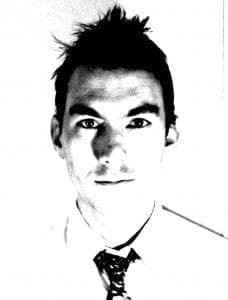 Ruschelle: Many writers have a ritual they perform before they put pen to paper or cursor to screen. Other than lots of candles, a cozy fire in the fireplace, a mini-chimenea crackling at your feet and the oven set on broil what else might your rituals be?
Ruschelle: Many writers have a ritual they perform before they put pen to paper or cursor to screen. Other than lots of candles, a cozy fire in the fireplace, a mini-chimenea crackling at your feet and the oven set on broil what else might your rituals be?
John: I prefer a heavy paper because I always write the first poem of the day in blood. So, first and foremost, I sterilize my pen, take a deep breath, then write.
Ruschelle: Blood poems are awesome! If you could collaborate with one other author on a project who would it be and why?
John: Bill Hicks. Partly because he’s dead and I’d love to pick his brain about his travels since death. Add him to my list of influences.
Ruschelle: Your bio states that you are an editor for Poetry Nook. What do you look for in other poets’ works?
John: Yes, I was an editor at Poetry Nook, where I read the poems entered in the free weekly contest (check it out – $150 first prize, $15 honorable mentions – and several spec poets have won or been mentioned). I can tell you more easily what I don’t like. Anything sappy, sentimental, or just cliché romantic, Hallmark stuff, is out. I also disapprove of poems that aim for rhyme and meter without the ability to do either well. A strong poem marries form with content, and too often poets who try to rhyme and have some sense of meter sacrifice both form, due to lack of technical ability, and content because they’re trying too hard to fit a form that doesn’t fit.
Always easier to say what we dislike, isn’t it? Implied above, I appreciate poems where the form compliments the content. I like surprises, and I like to read poems that do not require a chainsaw to understand. Dylan Thomas wrote something to the effect that he read poetry that he enjoyed – mastery, status, or acclaim aside. We should all be so honest in what we read and what we write.
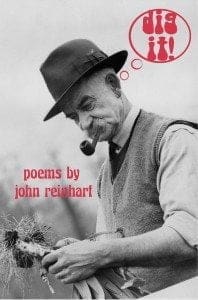 Ruschelle: I want to thank you for sharing a bit of yourself with us here at the Horror Tree. It’s been a pleasure. So what do you have planned for your next project? Can you share a little bit of info or… will you have to kill us if you tell us anything? Because that would really suck.
Ruschelle: I want to thank you for sharing a bit of yourself with us here at the Horror Tree. It’s been a pleasure. So what do you have planned for your next project? Can you share a little bit of info or… will you have to kill us if you tell us anything? Because that would really suck.
John: I’ve got a horror collection on the broiler and several other side projects that would require murder if they were revealed, or at least the removal of a couple organs for collateral.
“arson” is set for a Marchish release from NightBallet Press , and my next full-length collection, “dig in,” will be out shortly (fulfilling a funding promise to my Patreon patrons – consider supporting my work on an ongoing basis: all patrons will receive a copy of “dig in” regardless of their contributions). While a few pieces in “dig in” are speculative, the collection ranges across all my previous work in form and theme with a clear social conscience.
Check out John Reinhart! You won’t be disappointed.
homepage: Father, Poet, Arsonist
- About the Author
- Latest Posts
Ruschelle Dillon is a freelance writer whose efforts focus on the dark humor and the horror genres. Ms. Dillon’s brand of humor has been incorporated in a wide variety of projects, including the irreverent blog Puppets Don’t Wear Pants and novelette “Bone-sai”, published through Black Bed Sheet Books as well as the live-action video shorts “Don’t Punch the Corpse” and “Mothman”. She also interviews authors for the Horror Tree website.
Her short stories have appeared in various anthologies and online zines such as Strangely Funny III, Story Shack, Siren’s Call, Weird Ales- Another Round and Women in Horror Anthology Vol. 2, Sanitarium Magazine, Dark Voices and Fear and Fables. Her collection of short stories, Arithmophobia published by Mystery and Horror LLC, is available through Amazon & Barnes and Noble. Summer 2020, Black Bed Sheet Publishing will release her dark Novella, The Stain.

